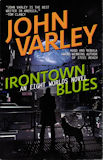Yes! Now, this is how space travel was always supposed
to be: build a spaceship in your back yard, jump aboard, point it where
you want to go, push the pedal to the metal, and, whoosh, three days
later, you're on Mars! None of this malarkey about thrust, and delta-v,
and fuel limits, and stuff.
Varley has given us a rip-roaring Golden Age space travel story, updated
for the new millennium. The spaceship in question is built by a
bunch of youngsters -- but they spend a million dollars on it, and have
proper project management, surplus Russian space suits, an ex-astronaut
adviser, and, most importantly, a space drive that uses newly discovered
sufficiently advanced technology (that is,
indistinguishable from magic).
And there's sex, and racism, and alcoholism, and child abuse, and divorce
-- but strictly as background to the plot: building that spaceship.
The vast majority of the book is one lovingly-created info-dump -- the
spaceship doesn't even take off for 300 pages. But that info-dump is done
in the best story-telling way (I'm trying not to say "Heinleinesque"
... and failing), and covers every little detail, from Florida swamp
navigation, to celestial dynamics. I love some of the lateral thinking
solutions they come up with -- look out for the in-flight cuisine!
The coincidences are huge (the kids just happen to nearly run over a
washed up ex-astronaut, who's cousin just happens to have invented a space
drive -- one of them just happens to have a trust fund to bank-roll the
project -- and so on), but who cares? It's not that kind of story. Leaving
aside the three things needed to make the story work (knowledge, money,
and magic) the rest is very well grounded in a realistic-feeling world
(depending on your precise definition of realistic, of course). And it is
compulsive reading.








